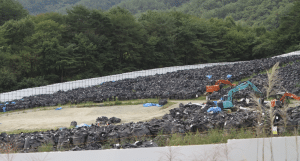A close call at Ukraine reactor: On luck and nuclear disasters
By Maxime Polleri | March 4, 2022
 Image courtesy of Willi Heidelbach/Pixabay
Image courtesy of Willi Heidelbach/Pixabay
As a scholar working in the field of nuclear disasters, I watched in horror as Russia tried to capture the Zaporizhzhia Nuclear Power Plant—likely for strategic military purposes, or to control the country’s supply of energy. I became especially worried when shelling set part of the complex on fire and began to wonder if another nuclear catastrophe was out to happen. Many of these fears were echoed by Ukraine’s Foreign Minister, who claimed in a viral tweet that a potential disaster at the plant would be ten times larger than Chernobyl, which remains the biggest nuclear catastrophe to this day.
Now, it appears that the fire was circumscribed and that the reactor building is undamaged, as there is no indication of elevated radiation levels. While this is reassuring, much worse could have easily happened; it was through sheer luck that a potentially catastrophic situation throughout Europe was averted.
As someone who has worked for more than 10 years on the Fukushima nuclear disaster, I came to learn the role that luck plays in nuclear catastrophes. Indeed, in the aftermath of Fukushima, luck played more of a role than either safety measures or security drills, when it came to mitigating the release of dangerous radioactive materials. After the initial release, prevailing winds protected most residents from harmful fallout by blowing the radioactivity to the sea.
But what if those winds had blown elsewhere? An important part of the Japanese archipelago would have been rendered uninhabitable for the long future, forcing the evacuation of major metropolitan centers like Tokyo. In Japanese language, this lucky wind was nicknamed the “divine wind”, in reference to the storms that apparently saved Japan from Mongol invasions in the 13th century.
Yet, even with such so-called “luck,” post-Fukushima Japan was still damaged, and the damage continues to mount: The disaster at Fukushima led to numerous evacuees losing their homes, transformed beautiful cities to ghost towns, created tremendous concerns about food safety, and cost millions—whether measured in Japanese yen or US dollars—for decontamination projects (and led to tremendous amounts of radioactive waste). It launched countless debates on the adverse health effects of radiation exposure, with some claiming a link between radiation and cancer, while others state that the fear of radiation causes more damage than the radiation itself. There are many other forms of social, cultural, medical, and economic suffering that are too numerous to all cite.

In spite of all these problems, the bureaucratic and political elites of Japan have kept pushing nuclear power as a national source of energy, gradually reopening their aging power plants under the ruse of responding to geopolitical tensions with China and North Korea.
In a timely book entitled Rethinking Nuclear Choices, political scientist Benoît Pelopidas examines the manifold vulnerabilities that surround nuclear security, notably underscoring the crucial role of luck in averting unwanted nuclear explosions and their catastrophic aftermath. By interviewing French political and military leaders, Pelopidas demonstrates that chance played a substantial part in the outcome of nuclear crises.
What would it have taken for the Zaporizhzhia Nuclear Power Plant to be seriously damaged and for Europe to face a disaster of unprecedented scale? Shelling in the wrong places or multiple fires? It would not have taken much, to say the least—and luck plays an important part in all this.
So far, humanity has been incredibly lucky when it comes to the undesirable outcomes of nuclear disasters. Yet, current political elites in power, be they from one country or another, rarely seem to learn from luck. But one day luck will run out and then it will be too la…
Together, we make the world safer.
The Bulletin elevates expert voices above the noise. But as an independent nonprofit organization, our operations depend on the support of readers like you. Help us continue to deliver quality journalism that holds leaders accountable. Your support of our work at any level is important. In return, we promise our coverage will be understandable, influential, vigilant, solution-oriented, and fair-minded. Together we can make a difference.















Love the poetic ending. ” But one day luck will run out and then it will be too la…”
Do the reactors have strong containment domes? Chernobyl and Fukushima did not. The spent fuel rods were not protected, either. Germany has kindly added a billion dollar containment dome on Chernobyl.